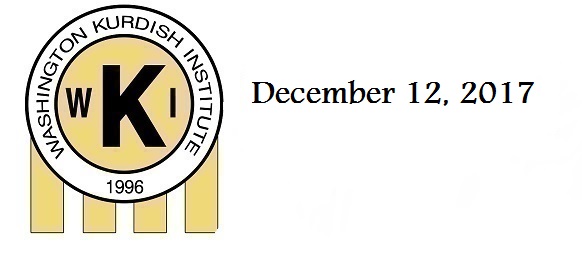909
Iran
- The Iranian regime sentenced a Kurdish woman, Zamana Zewey, to “50 lashes” because of her participation in a rally supporting the Kurdish independence referendum in Iraqi Kurdistan. The prosecutor in Saqez town accused Zewey of “disturbing the national security.” Since September 25, the Iranian Revolutionary Guards have been orchestrating a mass arrest campaign against those accused of rallying in support of the Iraqi Kurdistan’s September independence referendum.
Iraq
- On December 9, the Iraqi Prime Minister Haider Al Abadi declared the defeat of ISIS in Iraq. In the television address to the Iraqi people, Abadi thanked all military forces, but refused to mention or thank the Kurdish Peshmerga forces. Afterward the minister of the Peshmerga forces released a statement slamming Abadi for his “hatred” toward the Kurdish forces. “How does he expect them and the nation of Kurdistan to have the sense of belonging to Iraq when they see this is how the prime minister acts,” the statement read. On December 10, hundreds of Kurdish protesters criticized Abadi for his discrimination against Kurdish forces. Later Abadi’s office editted the written statement to include the Peshmerga after pressure from several Kurdish and non-Kurdish parties.
- Three earthquakes hit Iraqi Kurdistan in the span of a week. On December 11, a magnitude 5.4 earthquake hit Halabja city resulting in several injuries and property damages. And earlier, on December 7 and 8, two 4.2 and 4.1 magnitude earthquakes hit the border areas between Halabja and Iran. These minor earthquakes came after a stronger one hit the region last month leaving hundreds of dead and injured in Iraq and Iran.
- On December 6, 2017 the Makhmour Refugee Camp outside of the city of Makhmour was hit by rockets. Kurdish refugees and observers accused Turkish warplanes of the attack amid silence from the Iraqi and Turkish governments on the incident. The attacks resulted in the death of six guards in the camp and the injury of several civilians. Since 1998, the Makhmour Refugee Camp has been officially recognized by the United Nations as a refugee camp. It’s growing population now totals approximately 13,000 Kurds from Turkey.
Syria
- The High Electoral Commission of the Northern Syrian Federation announced the results of its local councils’ elections that were held on December 1. According to a recent press conference, the commission said that voter participation was 69 percent for all three regions (Afrin, Euphrates, and Al Jazeera). The Democratic Nation list, which includes the Democratic Union Party (PYD), won 4,621 local seats, while the Kurdish National Alliance, Syrian National Alliance, Democratic Unity, and independent candidates won the remaining 411 seats.
- On December 10, the Syrian Democratic Forces (SDF) and the Iraqi army held a meeting on the Syria-Iraq border. After the meeting, both sides agreed to establish a joint coordination operation for “border security and information flow.” In addition, a new border passing will be established to go through Deir Ez Zour in Syria.
- The People’s Defense Units (YPG) announced the death of ten of their fighters killed during “Al Jazeera Tempest,” the military campaign to clear Deir Ez Zour of ISIS and while clearing Raqqa city of mines.
- Turkey’s military and Islamist militia groups continue to bomb Afrin for a third straight week. The co-chair of Syrian Democratic Council Riad Derar criticized the Turkish role in Syria and said that “Turkey exploits the weakness of the state to impose a new presence for it and there are those who help it and allow it to penetrate.” Since last year, Turkey’s government has threatened to invade Afrin on several occasions.
Turkey
- After 339 days in prison, the first hearing of Selahattin Demirtas the Co-chair of the Pro-Kurdish Peoples’ Democratic Party (HDP) was held in Ankara, without his presence. 1,250 lawyers had applied to participate in the hearing and objected to the court room size which was designed to only fit 20 people. Turkey’s government did not allow Demirtas to participate because of “security” reasons. Demirtas’ defense team accused Turkey’s government of settling political accounts rather than implementing the law. Foreign observers were banned by Turkey’s government from participating in the hearing, which took place in a prison compound. Demirtas and 10 other HDP lawmakers are accused of “insulting the President” and “spreading terrorist propaganda.” At the end of the trial, the court extended Demirtas’ detention and delayed his hearing until Feb 14, 2018.
- The Former HDP Co-Chair Figen Yüksekdağ appeared in court for another hearing after she was sentenced to a year in prison less than two weeks ago. Similar to the Demirtas trail, international observers were prohibited from participating. The international observers delegation, which included representatives of political parties and human right activists, released a statement criticizing the prosecution and the court. The statement explained that “the conditions within which the hearings are being held are also in our view a great cause for concern,” adding “whereas the hearings should have been held within the Ankara regional court, they were moved to the specially built courthouse within the Sincan High Security Prison Complex.”

